The Excellence of Knowledge By Ibn Rajab al Hanbali
The Excellence of Knowledge By Ibn Rajab al Hanbali
Publisher:
Dar As Sunnah Publications
Author:
Ibn Rajab al Hanbali
Language:
English
Binding:
Soft Cover
Pages: 94
Size: A5 |5.8 x 8.3 in| 14.8x 21 cm
Couldn't load pickup availability
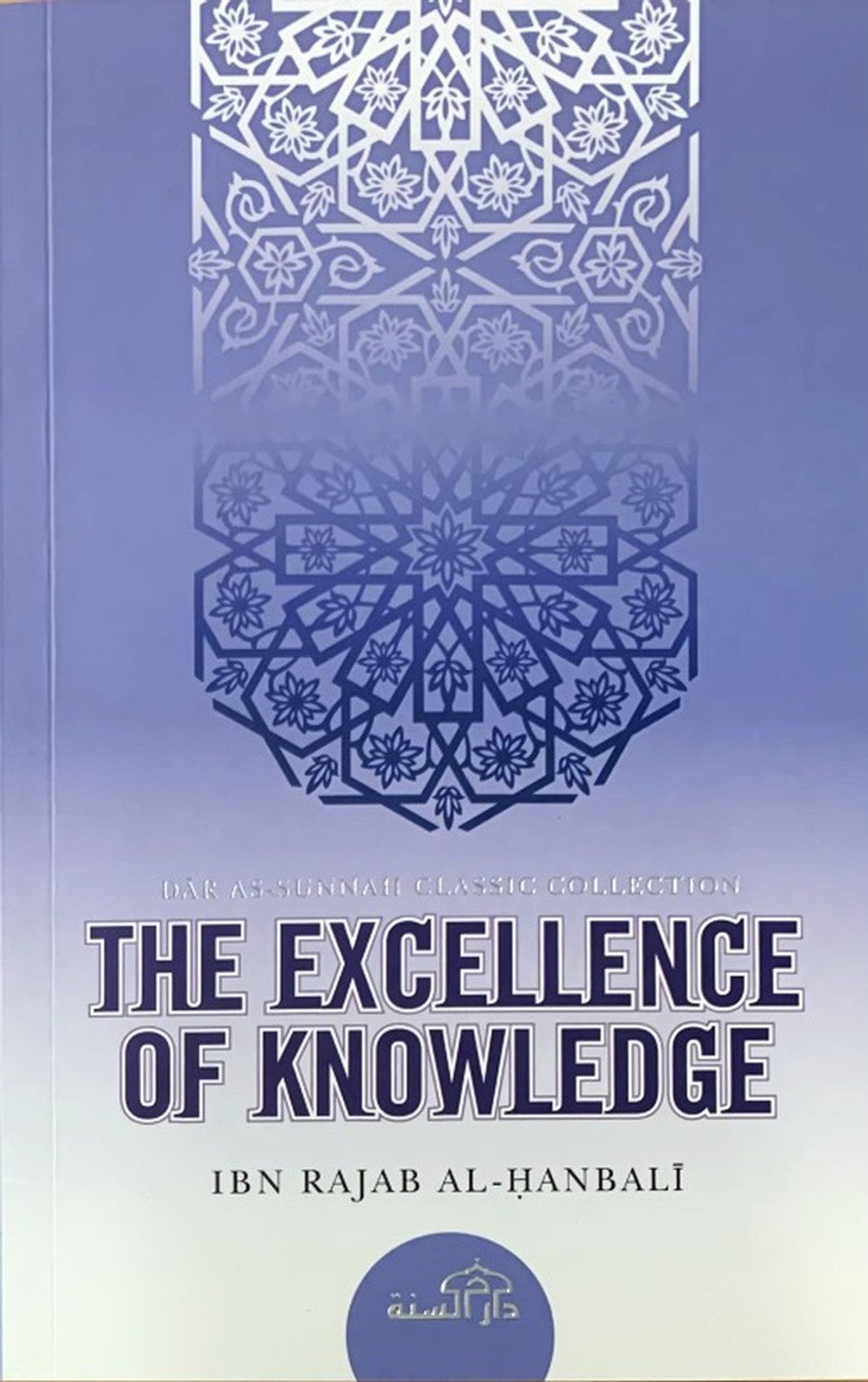
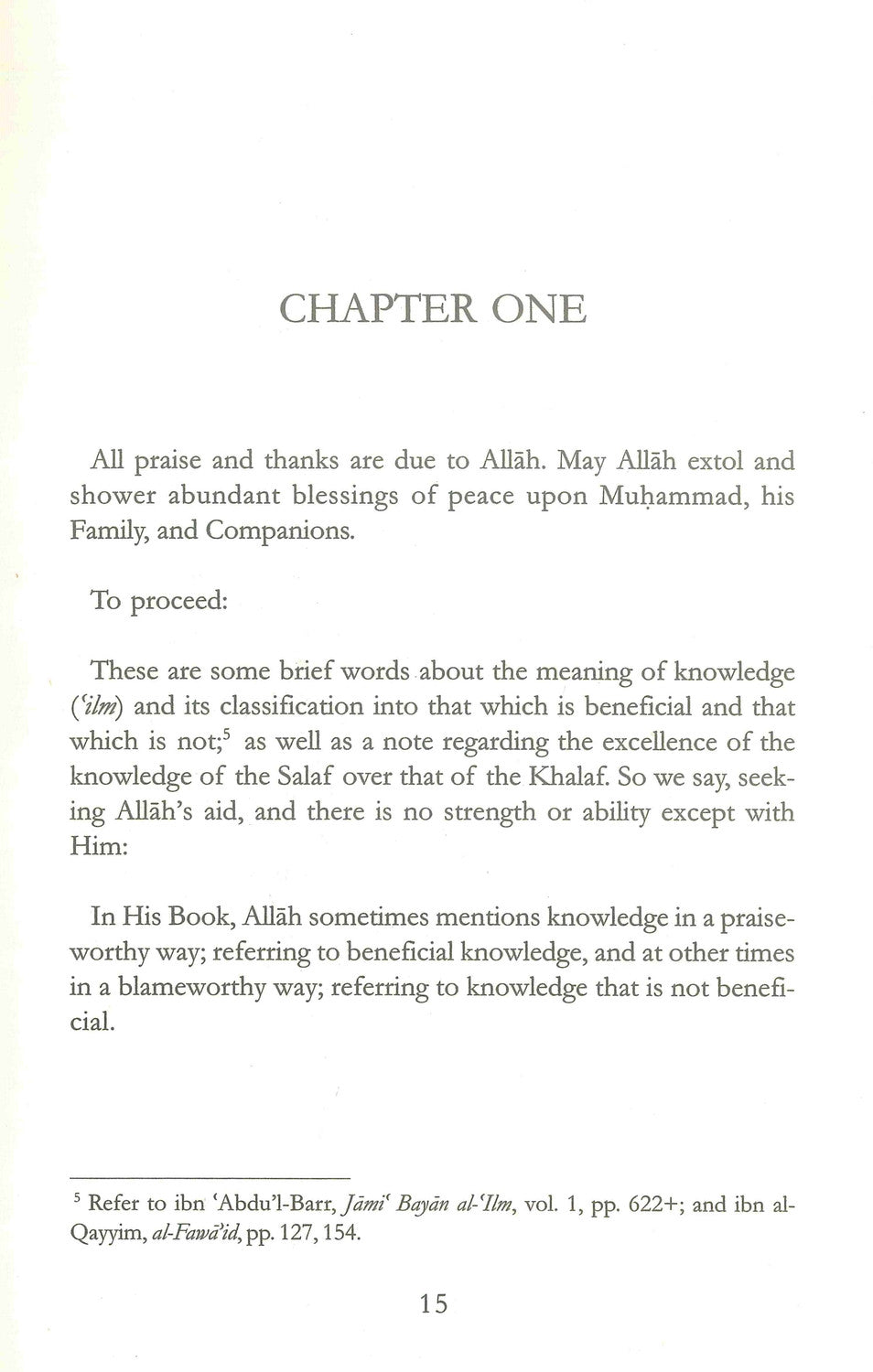
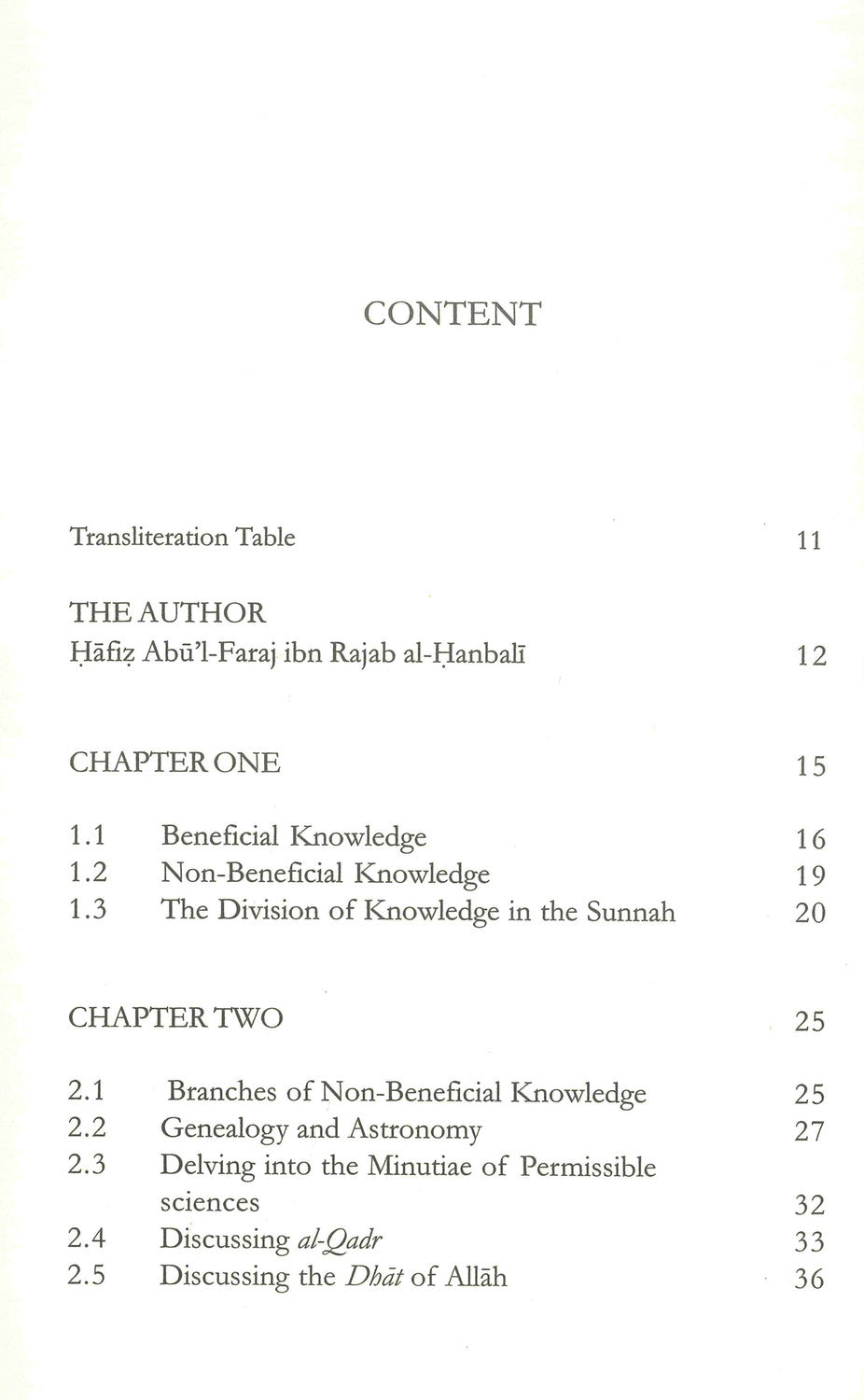
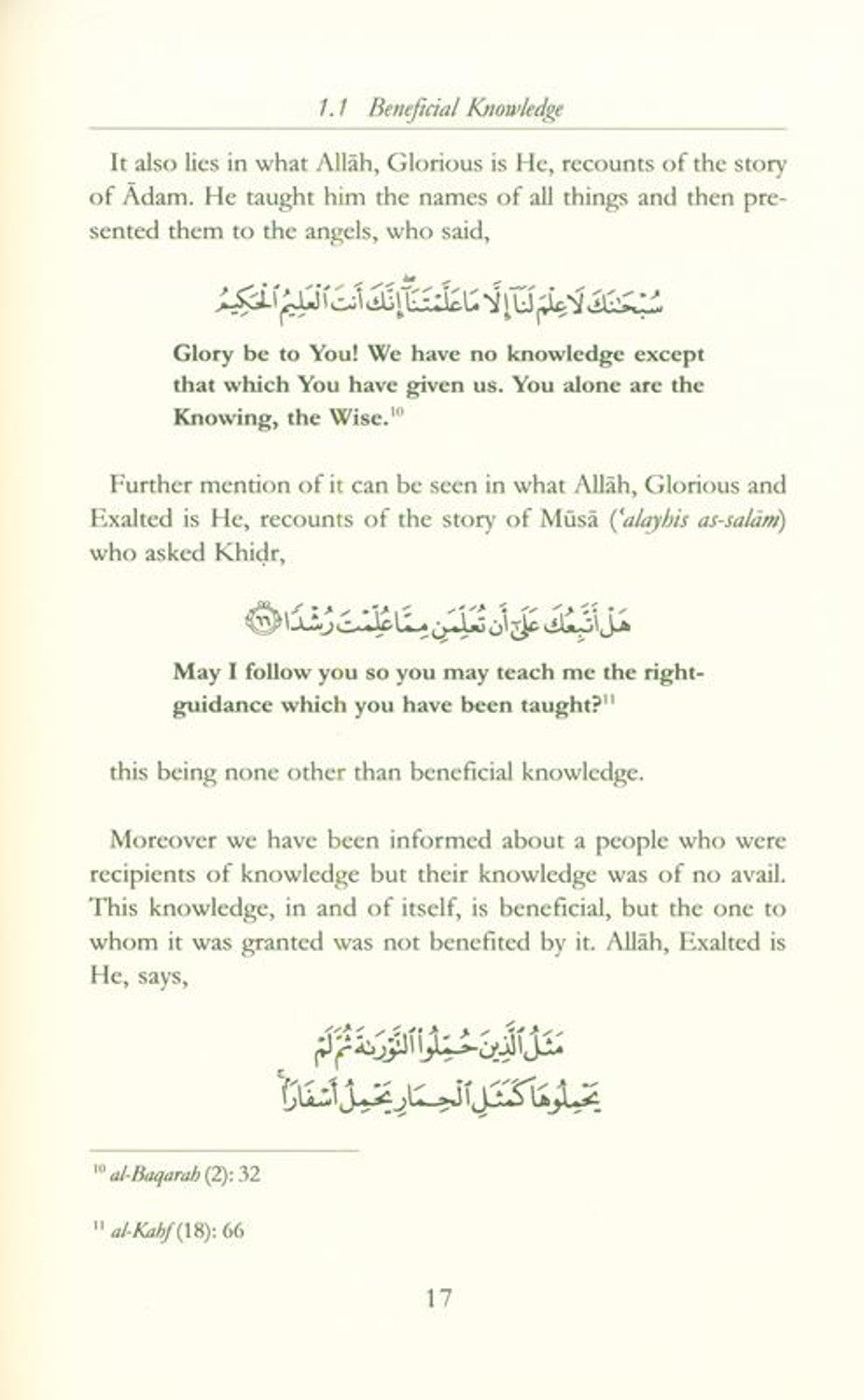
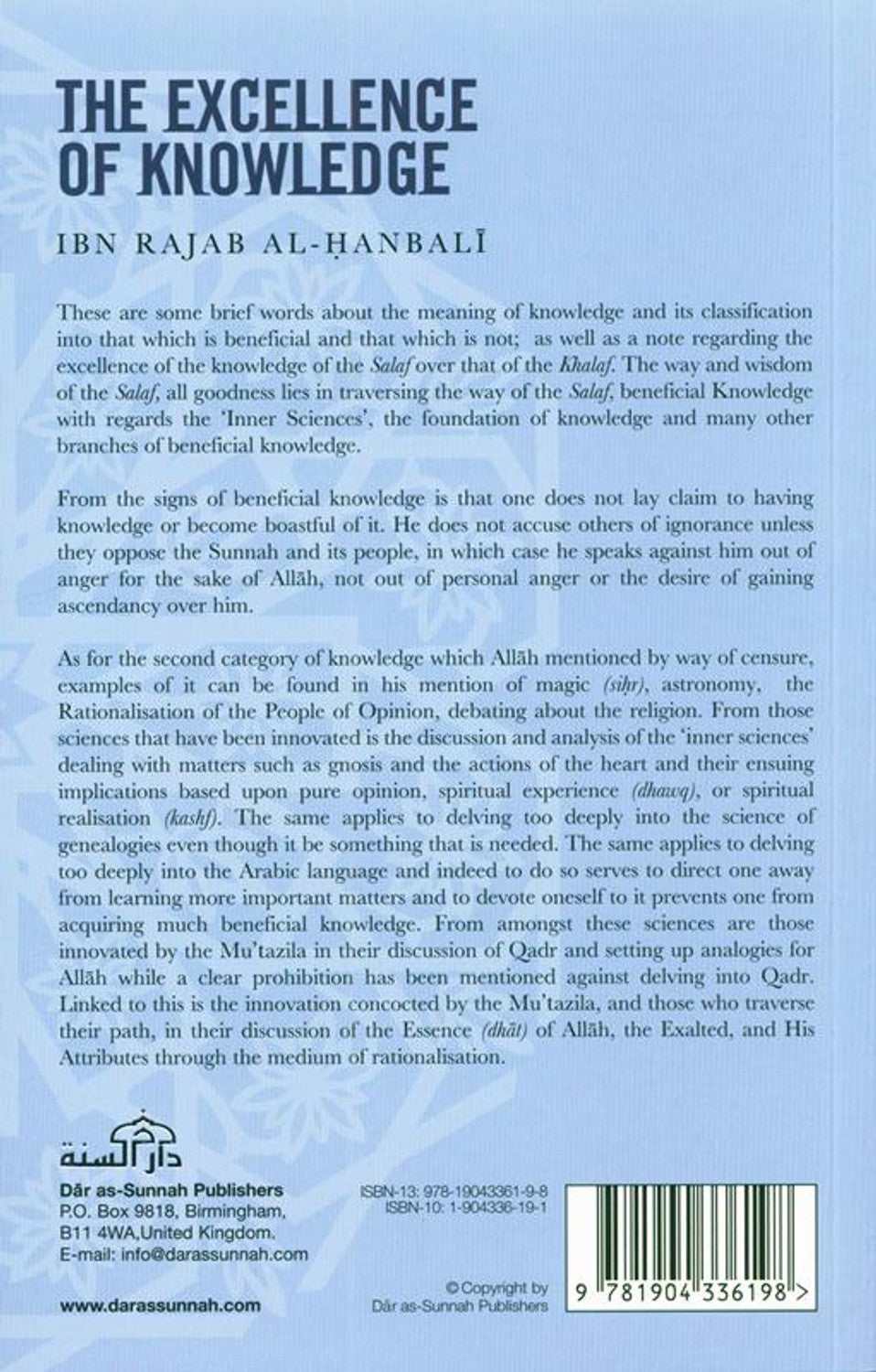
Collapsible content
Description of Book
The Excellence of Knowledge
This is a brief explanation of the concept of knowledge and its division into beneficial and non-beneficial, along with a mention of the superiority of the knowledge of the Salaf over that of the Khalaf. The methodology and wisdom of the Salaf embody all that is good, making it essential to follow their path in acquiring beneficial knowledge, including the "Inner Science" and other related branches.
Publisher
Dar As Sunnah Publications
Author
- Ibn Rajab al Hanbali
Sample Pages - Content
Page : 01
DAR AS-SUNNAH CLASSIC COLLECTION THE EXCELLENCE OF KNOWLEDGE IBN RAJAB AL-HANBALĪ دار السنة
Page : 02
CONTENT Transliteration Table THE AUTHOR Hafiz Abu'l-Faraj ibn Rajab al-Hanbali CHAPTER ONE 1.1 Beneficial Knowledge Non-Beneficial Knowledge 1.2 1.3 The Division of Knowledge in the Sunnah CHAPTER TWO 2.1 2.2 2.3 2.4 Branches of Non-Beneficial Knowledge Genealogy and Astronomy Delving into the Minutiae of Permissible sciences Discussing al-Qadr 2.5 Discussing the Dhat of Allāh 11 12 15 9920 16 19 25 55 225 25 27 36 333333333 32
Page : 03
CHAPTER ONE All praise and thanks are due to Allāh. May Allāh extol and shower abundant blessings of peace upon Muḥammad, his Family, and Companions. To proceed: These are some brief words about the meaning of knowledge (ilm) and its classification into that which is beneficial and that which is not; as well as a note regarding the excellence of the knowledge of the Salaf over that of the Khalaf. So we say, seek- ing Allah's aid, and there is no strength or ability except with Him: In His Book, Allāh sometimes mentions knowledge in a praise- worthy way; referring to beneficial knowledge, and at other times in a blameworthy way; referring to knowledge that is not benefi- cial. 5 Refer to ibn 'Abdu'l-Barr, Jami' Bayan al-'Ilm, vol. 1, pp. 622+; and ibn al- Qayyim, al-Fawa'id, pp. 127, 154. 15
Page : 04
1.1 Beneficial Knowledge It also lies in what Allah, Glorious is He, recounts of the story of Adam. He taught him the names of all things and then pre- sented them to the angels, who said, سُبْحَنَكَ لَا عِلْمَ لَنَا إِلَّا مَا عَلَّمْتَنَا إِنَّكَ أَنتَ الْعَلِيمُ الْحَكِيمُ Glory be to You! We have no knowledge except that which You have given us. You alone are the Knowing, the Wise.10 Further mention of it can be seen in what Allah, Glorious and Exalted is He, recounts of the story of Musa ('alayhis as-salām) who asked Khidr, هَلْ أَتَّبِعُكَ عَلَى أَن تُعَلِمَنِ مِمَّا عُلِّمْتَ رُشْدًا لله May I follow you so you may teach me the right- guidance which you have been taught?" this being none other than beneficial knowledge. Moreover we have been informed about a people who were recipients of knowledge but their knowledge was of no avail. This knowledge, in and of itself, is beneficial, but the one to whom it was granted was not benefited by it. Allah, Exalted is He, says, مَثَلُ الَّذِينَ حُمِلُوا النَّوْرَنَةَ ثُمَّ لَمْ يحمِلُوهَا كَمَثَلِ الْحِمَارِ يَحْمِلُ أَسْفَارًا 10 al-Baqarah (2): 32 al-Kahf (18): 66 17
Page : 05
THE EXCELLENCE OF KNOWLEDGE IBN RAJAB AL-HANBALI These are some brief words about the meaning of knowledge and its classification into that which is beneficial and that which is not; as well as a note regarding the excellence of the knowledge of the Salaf over that of the Khalaf. The way and wisdom of the Salaf, all goodness lies in traversing the way of the Salaf, beneficial Knowledge with regards the 'Inner Sciences', the foundation of knowledge and many other branches of beneficial knowledge. From the signs of beneficial knowledge is that one does not lay claim to having knowledge or become boastful of it. He does not accuse others of ignorance unless they oppose the Sunnah and its people, in which case he speaks against him out of anger for the sake of Allah, not out of personal anger or the desire of gaining ascendancy over him. the As for the second category of knowledge which Allah mentioned by way of censure, examples of it can be found in his mention of magic (sihr), astronomy, Rationalisation of the People of Opinion, debating about the religion. From those sciences that have been innovated is the discussion and analysis of the 'inner sciences' dealing with matters such as gnosis and the actions of the heart and their ensuing implications based upon pure opinion, spiritual experience (dhawq), or spiritual realisation (kashf). The same applies to delving too deeply into the science of genealogies even though it be something that is needed. The same applies to delving too deeply into the Arabic language and indeed to do so serves to direct one away from learning more important matters and to devote oneself to it prevents one from acquiring much beneficial knowledge. From amongst these sciences are those innovated by the Mu'tazila in their discussion of Qadr and setting up analogies for Allah while a clear prohibition has been mentioned against delving into Qadr. Linked to this is the innovation concocted by the Mu'tazila, and those who traverse their path, in their discussion of the Essence (dhat) of Allah, the Exalted, and His Attributes through the medium of rationalisation. Dár as-Sunnah Publishers PO. Box 9818, Birmingham, B11 4WA,United Kingdom. E-mail: info@darassunnah.com www.darassunnah.com ISBN-13: 978-19043361-9-8 ISBN-10: 1-904336-19-1 Copyright by Där as-Sunnah Publishers 9 781904 336198">
Who is Ibn Rajab Al-Hanbali?
Ibn Rajab al-Hanbali (1335–1393 CE) was a prominent Islamic scholar from the Hanbali school of jurisprudence, renowned for his deep knowledge of hadith, fiqh (Islamic jurisprudence), and Islamic spirituality. He is best known for his works on the virtues of the Islamic faith, such as Lata'if al-Ma'arif (The Subtle Blessings), which highlights the significance of Islamic holidays, acts of worship, and recommended practices. Ibn Rajab was also an expert in the science of hadith and authored works that discussed the lives and biographies of prominent scholars and the importance of piety and sincerity in worship. His scholarship continues to be highly regarded, especially for its emphasis on spirituality and ethical conduct.





